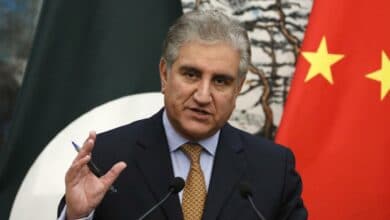Ruble plummets as Western sanctions hit Russia

(Update 1: Adds Swiss sanctions, Russia airspace response, details throughout, changes )
Moscow, Feb 28 (EFE).- The Russian economy was feeling the effects of tough Western sanctions Monday as the ruble plunged against the US dollar and Russia’s central bank tried to mitigate a foreign asset freeze by hiking interest rates and releasing reserves.
The ruble dropped 30% of its value against the dollar soon after foreign exchange markets opened, trading as low as 119 per dollar, its lowest rate since the early 1990s.
It was the first day that several Russian banks were banned from accessing the Swift international payment system at the behest of the European Union, the United States and other allies in response to Russia’s invasion of neighboring Ukraine.
Later on Monday, the US expanded its sanctions against Moscow by banning transactions with Russia’s central bank and freezing its US assets, something the EU had already done.
Neutral Switzerland also adopted the EU’s sanctions package against Russia and said it would freeze assets belonging to Russian president Vladimir Putin, foreign minister Sergei Lavrov and prime minister Mikhail Mishustin.
Russia’s central bank announced Monday morning that it would hike interest rates to 20% from 9.5% to compensate for inflation and devaluation, while Moscow ordered companies to sell 80% of their foreign currency revenues.
The bank said it would also release 733 billion rubles (around $7 billion) of bank reserves to protect the liquidity of lenders affected by the Western sanctions.
In a fresh blow to Russia’s economy over the weekend, Norway’s sovereign wealth fund announced it would divest from its Russian investments, which total a sum of around $3.4 billion, the government announced Sunday.
Responding to the sanctions in a meeting with economic officials, Putin described the West as an “empire of lies.”
Dmitry Peskov, the Kremlin’s spokesman, on Monday said that Russia was capable of handling the effects of the sanctions and would draw up a response.
The rattling of the Russian economy coincided with the first day of a blanket ban of Russian aircraft in EU airspace, which von der Leyen announced on Sunday evening.
Russia reacted in kind by closing its airspace to carriers from 36 countries, including most of Europe, unless they are granted special permission. EFE
cae-jt/ks





